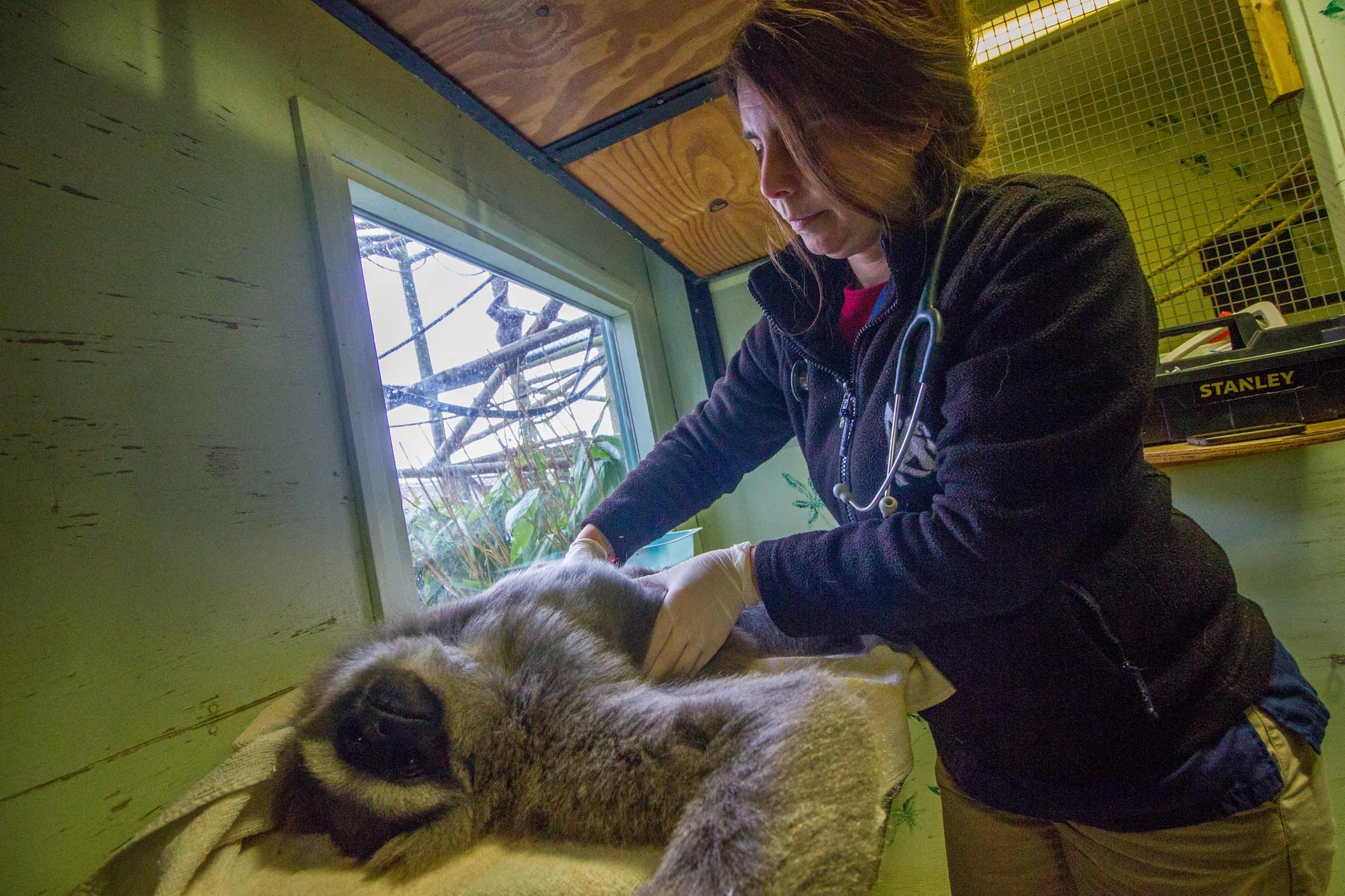-
For many years Howletts and Port Lympne have been lucky enough to house many Javan gibbons. In the vet department we have known for years that nearly all the Javan gibbons in our collections were positive for Hepatitis B. Hepatitis B is a very interesting virus with many different strains. In some species a strain of Hepatitis B seems to have co-evolved along with that species. This means that the virus is found in many members of that species and usually causes no harm.
OUR RESEARCH
When we started our Javan primate conservation and rescue programme in 2011 we found that nearly all of the rescued Javan gibbons were also positive for Hepatitis B. These gibbons would have come from the wild as infants and then been kept as pets until they were rescued by the Aspinall Foundation. This presented us with a problem- there was no way we could release Javan gibbons with Hepatitis B into the wild without looking at whether the virus was present in the existing wild population.

Preparing an animal to go back to the wild from captivity is a very long and difficult process. As vets one of our main responsibilities is to ensure that the animals we release back in the wild do not cause disease in any of the species already in the wild. To release an animal into the wild with a disease that would endanger the health of existing wild populations would be both devastating and very irresponsible.
As nearly all our Javan gibbons carried the Hepatitis B virus we suspected it was also present in the wild population of Javan gibbons, and that they had their own special Javan gibbon strain of the virus. No work had ever been carried out in wild Javan gibbons to look at this so we had to come up with a plan. The easiest way to test wild gibbons for Hepatitis B would have been to take blood from them. This, however, was impossible- understandably and very correctly the Javan government would not issue permits for their precious wild Javan gibbons to be caught and sedated for blood samples.
We were very lucky to have expert advice from specialists at Public Health England and they confirmed that they should be able to isolate the Hepatitis B virus from the faeces of wild gibbons. This was great news for us! To test out the theory we sent the specialists faeces of our captive Javan gibbons at Howletts and Port Lympne, and sure enough they managed to isolate the Hepatitis B virus.
By this time we were very excited about our project. The next stage was difficult though- actually collecting faeces from wild gibbons. Our Javan team did an excellent job with this and after several months of gaining permission, identifying suitable gibbon populations and careful planning they were ready to collect wild gibbon faeces! The actual collection required a lot of patience. Our team had to identify and follow a gibbon until faeces was passed. Then they had the difficult and unenviable task of finding and collecting the faeces! Eventually 17 samples were collected. The samples were shipped (with a huge amount of paperwork and certificates) to the UK and the specialists at Public Health England soon gave us the amazing news that they had isolated Hepatitis B virus from the faeces of the wild Javan gibbons. Not only that, but all the gibbons they had tested (UK captive and Javan wild) had the same strain of Hepatitis B that was different to other Hepatitis B viruses- ‘Javan gibbon Hepatitis B virus’. A huge amount of work had gone into getting this result and it was amazing to get the it.
In 2013 the Aspinall Foundation paid for a delegation of Javan government ministers to come to the UK and look at the results of our work. We were asking them to change their policy on releasing Javan gibbons with Hepatitis B. As the virus seemed to be widespread in the wild population it seemed reasonable to release Javan gibbons with Hepatitis B- as long as we had proved that it was exactly the same strain. Sure enough the Javan government ministers changed their policy and in 2014 the Aspinall Foundation was able to release its first Hepatitis B positive gibbon- Cheri. Cheri has since paired up with a female wild gibbon and they have an infant, Deri.
RELEASING CAPTIVE BORN GIBBONS:
The Aspinall Foundation has now released several Javan gibbons rescued in Java that have Javan gibbon Hepatitis B virus.
More recently we have had another problem to overcome- although it was now possible to release Javan gibbons into the wild with Javan gibbon Hepatitis B virus it was still against government policy to import primates into Java with Hepatitis B. The Aspinall Foundation wanted to send some of its UK captive Javan gibbons back to the wild and as many of them have the virus this was a problem. After a lot more work with the Javan government they have again changed their policy so that Javan gibbons with Javan gibbon Hepatitis B virus can be imported. The first shipment of our UK gibbons with Javan gibbon Hepatitis B is due to leave later this month and after years of work to get them to this point I cannot wait to see them go.


